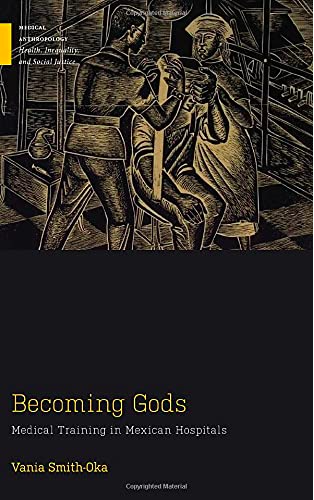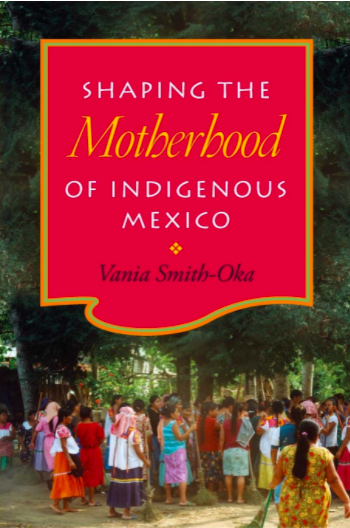As a medical anthropologist, I am interested in research examining topics such as medical spaces, women’s reproductive health and cesareans, obstetric violence, and mentorship in the medical field.
Below are summaries of my projects and PDFs of my publications. Feel free to contact me if you have any further questions on my research.
Becoming Gods: Medical Training in Mexican Hospitals
This project took place from 2012 to 2016 and examined how medical trainees acquire the skills, knowledge, and attitudes of medicine. The research followed a cohort of doctors-in-training in the Mexican city of Puebla as they learned to become doctors. I carried out fieldwork, ethnography, and interviews with interns, residents, and doctors that tell the story of how medical trainees learn to wield new tools, language, and technology and how their white coat, stethoscope, and newfound technical, linguistic, and sensory skills lend them an authority that they cultivate with each practice, transforming their sense of self. This research illustrates the messy, complex, and nuanced nature of medical training, where trainees not only have to acquire a monumental number of skills but do so against a backdrop of strict hospital hierarchy and a crumbling national medical system that deeply shape who they are.
Becoming Gods: Medical Training in Mexican Hospital Wards
Vania Smith-Oka
Crossing Bodily, Social, and Intimate Boundaries: How Class, Ethnic, and Gender Differences Are Reproduced in Medical Training in Mexico
Teaching about Birth in Mexico: Working Across Birth Models
Email me for PDF
We Work with What We Have, Not with What We Would Like to Have
Email me for PDF
Shaping the Motherhood of Indigenous Mexico
A primary focus of my early research program was to identify how large-scale health care and development policies may adversely impact the reproductive lives of marginalized (indigenous) women. Given that many low-income women worldwide are enrolled in welfare/development programs it was important to understand these effects, which may explain associations between the policies’ missions / values and women’s reproductive agency. My work in this area documented how these policies shaped indigenous women’s family planning choices. It analyzed the unintended consequences that emerge from the interaction between indigenous women, medicine, and conditional cash transfer programs. This research was based on participant observation and in-depth interviews with women, doctors, nurses, and policymakers in Mexico. Results showed that the close association of government policies with medical practitioners served to unintentionally constrain women’s reproductive decisions. My work contributed to important conversations about women’s reproductive rights within a larger struggle for human rights and dignity.
Shaping The Motherhood of Indigenous Mexico
Social Support and Social Suffering: Uterine Health and Isihuayo Among Indigenous Women in Mexico
Email me for PDF
Bodies of risk: Constructing motherhood in a Mexican public hospital
Fallen Uterus: Social Suffering, Bodily Vigor, and Social Support among Women in Rural Mexico.
Plants Used for Reproductive Health by Nahua Women in Northern Veracruz, Mexico1
An analysis of two indigenous reproductive health illnesses in a Nahua community in Veracruz, Mexico
Unintended consequences: Exploring the tensions between development programs and indigenous women in Mexico in the context of reproductive health
Risk, Reproduction, and Narratives of Experience, Book published 2012
Edited by Lauren Fordyce and Amínata Maraesa
Chapter 5: “They Don’t Know Anything” How Medical Authority Constructs Perception of Reproductive Risk among Low-Income Mothers in Mexico
Email me for PDF
Investigating Obstetric Violence in Mexico and Kenya
My research focused on the connection between obstetric risk, medical practice, and concepts of good/bad motherhood. One prong of the research examined how clinicians’ perceptions of their marginalized obstetric patients’ social lives shaped their interactions and decisions about the women’s health. The central findings showed that birth was defined as a risky event, that clinicians conflated social factors with biological factors in their management of risk, and that marginalized patients were a priori classified as bad mothers. The second prong examined the presence of structural and obstetric violence in the biomedical model of birth. The central findings showed that clinicians’ stressful work environment and class-based stereotypes of low-income women resulted in the routinizing of inhumane medical practices. Hospital overcrowding due to health reforms led to clinicians being primarily concerned with moving patients swiftly through the system, leading to an increase in cesarean rates. My work has been central to conversations about obstetric violence and has contributed important concepts about microaggressions and bureaucratization of medical practices.
Microagressions and the reproduction of social inequalities in medical encounters in Mexico
Managing Labor and Delivery among Impoverished populations in Mexico: Cervical Examinations as Bureaucratic Practice
Exploring mistreatment of women during childbirth in a peri-urban setting in Kenya: experiences and perceptions of women and healthcare providers


